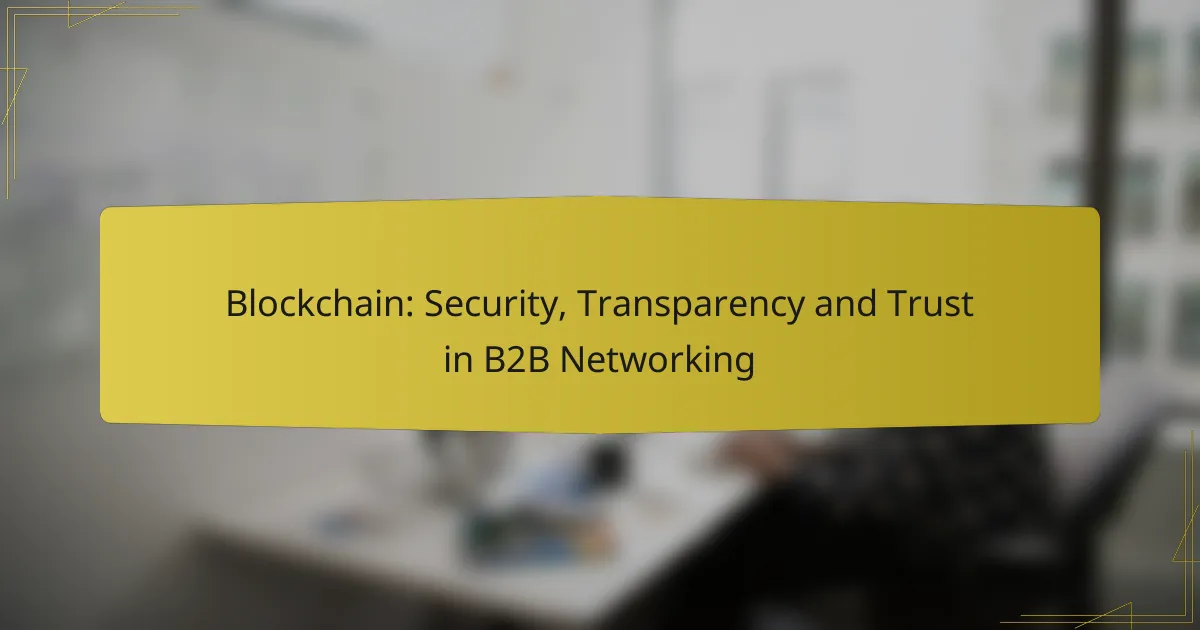Blockchain technology revolutionizes B2B networking by enhancing security, transparency, and trust among business partners. Its decentralized structure minimizes the risk of fraud and unauthorized access while providing real-time visibility into transactions, fostering accountability. By carefully implementing blockchain solutions, businesses can significantly improve their interactions and build stronger relationships in the marketplace.

How Does Blockchain Enhance Security in B2B Networking?
Blockchain enhances security in B2B networking by providing a decentralized and transparent system that reduces the risk of fraud and unauthorized access. Its unique structure ensures that data integrity is maintained, fostering trust among business partners.
Decentralized data storage
Decentralized data storage is a core feature of blockchain technology, where data is distributed across a network of computers rather than being stored in a single location. This reduces the risk of data breaches, as there is no central point of failure that hackers can target.
In a B2B context, companies can share sensitive information without worrying about a single entity controlling the data. For example, supply chain partners can access transaction data securely, ensuring that all parties have the same information without relying on a central database.
Cryptographic encryption
Cryptographic encryption is essential for securing transactions on a blockchain. Each transaction is encrypted using advanced algorithms, making it nearly impossible for unauthorized users to access or alter the data. This ensures that only authorized parties can view or modify the information.
In B2B networking, this means that sensitive business transactions, such as contracts or payment details, are protected from interception. Companies can confidently share information, knowing that encryption safeguards their data against potential threats.
Immutable transaction records
Immutable transaction records are a significant advantage of blockchain technology. Once a transaction is recorded on the blockchain, it cannot be altered or deleted, creating a permanent and transparent history of all interactions. This feature enhances accountability among business partners.
For instance, in a B2B setting, if a supplier and a retailer engage in a transaction, both parties can refer back to the immutable record to resolve disputes or verify compliance. This transparency builds trust and reduces the likelihood of fraud, as all transactions are verifiable by all involved parties.

What Role Does Transparency Play in B2B Blockchain Networks?
Transparency in B2B blockchain networks is crucial as it fosters trust among participants by allowing all parties to view transactions in real-time. This visibility helps ensure accountability and reduces the risk of fraud, thereby enhancing the overall integrity of business interactions.
Real-time transaction visibility
Real-time transaction visibility allows all stakeholders in a B2B network to monitor transactions as they occur. This immediate access to information helps businesses confirm the status of orders, payments, and deliveries without delays. For instance, a supplier can instantly verify that a payment has been made, reducing the time spent on reconciliation.
Additionally, this visibility can lead to quicker decision-making, as businesses can respond promptly to any discrepancies or issues that arise during transactions. By minimizing the lag in information flow, companies can enhance operational efficiency and customer satisfaction.
Audit trails for compliance
Blockchain technology automatically creates an immutable audit trail for every transaction, which is vital for compliance with regulations. This feature allows businesses to track and verify each step in a transaction’s lifecycle, providing a clear record for audits. For example, companies in regulated industries can easily demonstrate compliance with financial regulations by presenting these audit trails.
Moreover, having a reliable audit trail reduces the risk of disputes between parties, as all transaction details are recorded and accessible. This transparency not only aids in compliance but also strengthens relationships between businesses by fostering a culture of accountability.
Stakeholder trust through openness
Openness in B2B blockchain networks builds stakeholder trust by ensuring that all parties have equal access to information. When businesses operate transparently, they signal to their partners that they are committed to ethical practices and accountability. This trust is essential for long-term partnerships and can lead to better collaboration and innovation.
To cultivate this trust, companies should actively share relevant data and insights with their partners, ensuring that everyone is informed and aligned. Regular updates and open communication can further enhance this trust, making it easier to navigate challenges together.

How Can Businesses Implement Blockchain Solutions?
Businesses can implement blockchain solutions by carefully selecting the right platform, integrating it with existing systems, and training staff for effective adoption. This approach ensures that the transition to blockchain technology enhances security, transparency, and trust in B2B networking.
Choosing the right blockchain platform
Selecting the appropriate blockchain platform is crucial for successful implementation. Factors to consider include scalability, security features, transaction speed, and compatibility with existing systems. Popular platforms like Ethereum, Hyperledger, and Corda offer different strengths depending on business needs.
Evaluate the specific use case and industry requirements to determine the best fit. For instance, if low transaction costs and high throughput are priorities, platforms like Binance Smart Chain might be suitable. Conducting a pilot project can also help assess platform performance before full-scale deployment.
Integration with existing systems
Integrating blockchain solutions with current systems is essential for seamless operations. This may involve connecting blockchain applications with databases, ERP systems, or supply chain management tools. A well-planned integration strategy can minimize disruptions and enhance overall efficiency.
Consider using APIs or middleware to facilitate communication between blockchain and legacy systems. It’s important to ensure data consistency and security during this process. Testing the integration in stages can help identify potential issues early on.
Training staff for blockchain adoption
Training staff is vital for the successful adoption of blockchain technology. Employees should understand the fundamentals of blockchain, its benefits, and how it impacts their roles. Offering workshops, online courses, or hands-on training can enhance their skills and confidence in using the new system.
Encourage a culture of continuous learning and provide resources for ongoing education. Addressing common concerns and misconceptions about blockchain can also help alleviate resistance to change. Regular feedback sessions can further support staff as they adapt to new processes.

What Are the Key Benefits of Blockchain for B2B Transactions?
Blockchain technology offers significant advantages for B2B transactions, primarily through enhanced security, transparency, and trust. These benefits help businesses streamline operations and reduce risks associated with traditional transaction methods.
Reduced fraud risk
Blockchain’s decentralized nature makes it difficult for fraudsters to manipulate transaction data. Each transaction is recorded on a public ledger that is immutable and transparent, allowing all parties to verify the authenticity of transactions in real-time.
For example, in supply chain management, blockchain can track the origin of goods, ensuring that products are genuine and not counterfeit. This level of transparency significantly lowers the risk of fraud in B2B dealings.
Lower transaction costs
By eliminating intermediaries, blockchain can reduce transaction costs significantly. Traditional B2B transactions often involve banks and payment processors, which charge fees that can add up quickly.
With blockchain, businesses can transact directly with one another, minimizing these costs. Estimates suggest that companies can save anywhere from 30% to 50% on transaction fees by adopting blockchain solutions.
Faster settlement times
Blockchain technology enables near-instantaneous settlement of transactions, compared to traditional methods that can take days. This speed is particularly beneficial for businesses that require quick access to funds or need to finalize deals rapidly.
For instance, cross-border payments that typically take several days can be completed in a matter of minutes using blockchain. This efficiency can enhance cash flow and improve overall business agility.

What Challenges Do Companies Face When Adopting Blockchain?
Companies face several challenges when adopting blockchain technology, including regulatory compliance, scalability, and interoperability with existing systems. Addressing these issues is crucial for successful implementation and maximizing the benefits of blockchain in business operations.
Regulatory compliance issues
Regulatory compliance is a significant challenge for companies looking to adopt blockchain. Different countries have varying regulations regarding data privacy, financial transactions, and digital assets, which can complicate compliance efforts. Businesses must stay informed about local laws and ensure that their blockchain solutions adhere to these regulations.
For example, the General Data Protection Regulation (GDPR) in the European Union imposes strict rules on data handling, which can conflict with blockchain’s immutable nature. Companies should consult legal experts to navigate these complexities effectively.
Scalability concerns
Scalability is another critical issue for businesses implementing blockchain. Many blockchain networks struggle to handle a high volume of transactions quickly, leading to delays and increased costs. Companies need to assess whether the chosen blockchain solution can scale to meet their operational demands.
For instance, public blockchains like Bitcoin can process only a limited number of transactions per second, which may not suffice for large enterprises. Exploring layer-2 solutions or private blockchains can help mitigate these scalability concerns.
Interoperability with legacy systems
Interoperability with legacy systems poses a challenge for companies adopting blockchain. Many businesses rely on established software and infrastructure, making it difficult to integrate new blockchain solutions seamlessly. Ensuring compatibility is essential to avoid disruptions in operations.
Companies should conduct a thorough analysis of their existing systems and identify potential integration points. Developing APIs or using middleware can facilitate smoother transitions and enhance the overall efficiency of blockchain adoption.

What Are the Best Practices for Blockchain Implementation?
Best practices for blockchain implementation include conducting thorough assessments, selecting the right technology, and ensuring compliance with relevant regulations. These steps help organizations maximize the benefits of blockchain while minimizing risks.
Conducting a thorough needs assessment
A thorough needs assessment is essential for identifying the specific requirements and goals of a blockchain project. This process involves evaluating existing systems, understanding stakeholder needs, and determining how blockchain can enhance efficiency, security, and transparency.
Key considerations during the assessment include the volume of transactions, data sensitivity, and the level of trust required among participants. Engaging with stakeholders early can help clarify expectations and identify potential challenges.
Common pitfalls to avoid include underestimating the complexity of integration with existing systems and overlooking regulatory requirements. A well-defined needs assessment can guide the selection of appropriate blockchain solutions and ensure alignment with business objectives.
